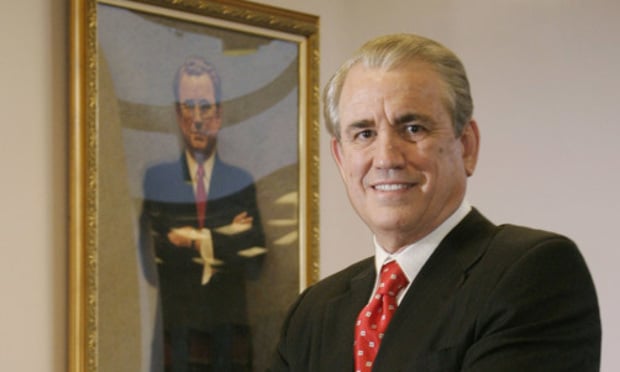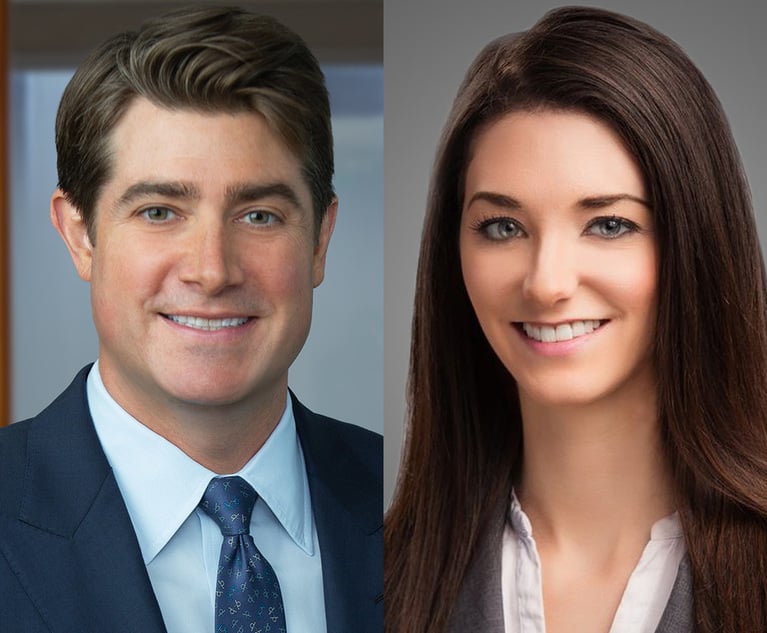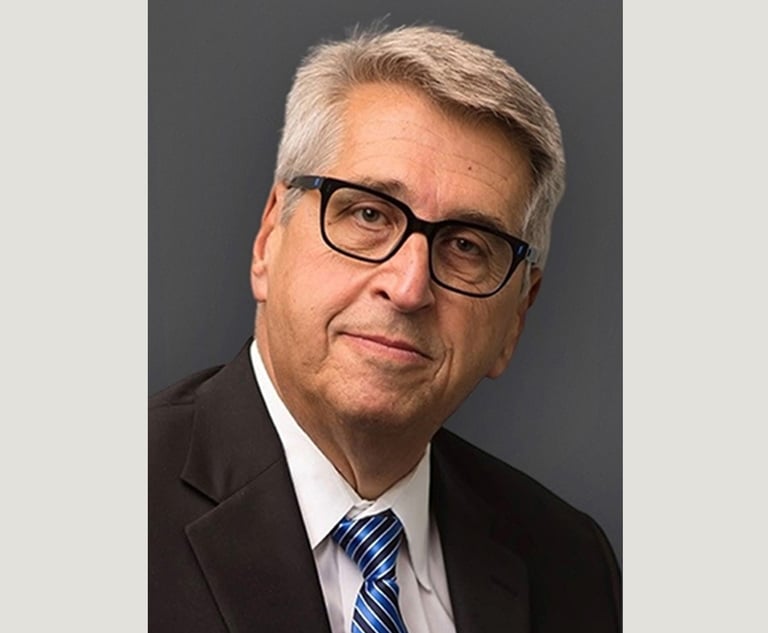A Decade After O'Quinn's Death: Litigation, Legal Fees, Foundation Live On
Plaintiffs lawyer John M. O'Quinn died in a car accident 10 years ago, and lawyers are still wrapping up the litigation related to his firm and estate. All of his money, including legal fees that continue to be paid today, has gone to charity.
October 29, 2019 at 02:25 PM
8 minute read
 The late John O'Quinn.
The late John O'Quinn.
It's been 10 years since Houston plaintiffs lawyer John M. O'Quinn died in a car accident, and over that entire decade, lawyers have toiled on dozens of lawsuits filed against O'Quinn's former firm or related to his estate.
O'Quinn was well-known among the Texas trial bar for his ability to sway a jury. By 2000, he had won more than 250 cases with verdicts of $1 million or more, including $105 million in a 1984 benzene suit and $65 million in two silicone breast implant suits in the early 1990s.
But at the same time, he was a magnet for controversy, including State Bar of Texas disciplinary actions alleging he benefited from barratry.
The litigation over his firm and his estate is largely resolved, but not entirely. The legendary trial lawyer's estate remains open in Harris County Probate Court, and his firm remains open, though not actively involved in litigation, as the funds from a settlement reached over two decades ago continue to flow in each year.
Houston trial lawyer Dale Jefferson, who said he worked on 90% of the O'Quinn-related litigation, said the sole remaining court action is an appeal in a suit O'Quinn's longtime girlfriend Darla Lexington filed in 2017 after O'Quinn's body was taken from a grave in the Texas Hill Country and interred in Louisiana. A probate judge dismissed Lexington's suit, which sought the return of O'Quinn's body, but Lexington filed an appeal.
Cary Gray, the independent administrator of O'Quinn's estate, said his work is winding down, but he can't pinpoint when it will be completed. Gray, a partner at Gray Reed & McGraw in Houston, said it's not unusual for an estate as complicated as O'Quinn's to take more than a decade to resolve.
"That would just be the nature of an estate of somebody who had a significant and wide array of business interests," said Gray, who was appointed administrator after T. Gerald Treece resigned in 2017 as executor of O'Quinn's estate after serving in that role since O'Quinn died.
That resignation was not without controversy. Treece resigned shortly after he settled a lawsuit brought by the John M. O'Quinn Foundation, which alleged he had treated the estate as his "personal slush fund."
Terms of that 2017 settlement, which followed a one-day mediation, were confidential, according to lawyers involved in the case. Treece, now a professor at South Texas College of Law, is on sabbatical, according to a message on his voicemail, and could not be reached for comment.
An Active Litigator's Unexpected Death
O'Quinn and Johnny Cutliff, an employee of the O'Quinn Law Firm, died Oct. 29, 2009, in a car crash. O'Quinn was driving when his car crossed a median on Allen Parkway and crashed into a tree.
O'Quinn, who had no children, left his estate to his foundation, which he established in 1986. According to its website, the foundation had awarded more than $117 million in grants to numerous charities benefiting children, medical institutions and education as of Dec. 31, 2017. Gray said the foundation gave away $3.25 million in 2017, in its most recent reporting year.
O'Quinn's death shocked the Houston legal community. His courtroom success—including a $1 billion verdict he won in 2004 against Wyeth Laboratories, in a suit over the diet drug fen-phen—contrasted with controversies over the two Texas Bar disciplinary suits that O'Quinn successfully fended off .
In 1989, the bar and O'Quinn settled one suit when he accepted a public reprimand and performed community service. The bar had accused him of hiring eight runners to solicit more than 100 clients, allegations O'Quinn denied.
In 1998, O'Quinn and two other plaintiffs lawyers were exonerated in a disciplinary suit that alleged they solicited clients after a 1994 plane crash in South Carolina, allegations the three lawyers denied.
At the time of O'Quinn's death, Jefferson said, at least nine lawsuits against O'Quinn or his firm were ongoing.
"For the large part, all of the litigation primarily dealt with the operation of the O'Quinn law firm—legal malpractice claims, referral fee dispute claims—the type of garden-variety lawsuits that the O'Quinn firm had dealt with historically over the years," said Jefferson, a partner at Martin, Disiere, Jefferson & Wisdom in Houston.
But, following his death at age 68, O'Quinn's estate faced more than 80 claims related to O'Quinn personally, his law firm or one of his many other ventures including real estate holdings. Those claims resulted in about 50 lawsuits, he said.
Some claims went to trial or arbitration, including referral-fee litigation and several malpractice suits stemming from silicosis cases
Other matters were unrelated to his legal practice. For instance, several suits were tied to O'Quinn's massive and valuable classic car collection, Jefferson said.
"On the date that John died, he owned 868 cars that were worth in excess of $100 million," Jefferson said.
O'Quinn's longtime companion, Lexington, had also claimed some assets from the estate. In 2012, O'Quinn's estate and foundation settled that case under confidential terms.
Jefferson, who started doing work for O'Quinn's firm around 2000, said a number of other lawyers in Houston handled litigation for O'Quinn's firm or estate matters following his death. He said they include Sarah Pacheco, a shareholder in Crain Caton & James; Billy Shepherd of Shepherd Prewett; Don McFall and Ken Breitbeil of McFall, Breitbeil & Eidman; solo attorney Mike O'Brien; and Danny Goforth of Goforth Law Firm.
Neither Gray nor Jefferson could provide an estimate of how much the estate spent on legal fees over the last decade. But Jefferson, who handled much of the litigation, said he spent about 35% of his time on O'Quinn-related work during the first two years after his death, roughly 2% the last two years, and about 15% in the intervening years.
O'Quinn's Legacy
Jefferson said The O'Quinn Law Firm, which had 17 lawyers at the time of O'Quinn's death, has not totally wound down yet, although it has no lawyers and hasn't taken a case for nearly a decade. It remains open in part, he said, because the firm continues to receive fee payments from a $17.3 billion settlement between the state of Texas and the tobacco industry.
O'Quinn was one of the so-called Tobacco Five, the high-profile group of plaintiffs lawyers who negotiated the 1998 settlement for the state. They signed a contingent-fee contract with Texas entitling them to 15% of the state's recovery, or roughly $2.3 billion. But in 1999, they renounced their rights in the contract, opting instead for a $3.3 billion fee awarded by an arbitration panel in December 1998.
According to Jefferson, annual payments of $20 million to $22 million will continue to be paid through January 2024.
Additionally, according to Gray, the estate administrator, the O'Quinn firm still holds funds in trust for minor children who were plaintiffs he represented, and it cannot officially close until those children come of age.
When Gray took on the administrator role in 2017, he said, the firm still had six employees who were dealing with the "huge job" of disposing of the firm's files. Now just two employees remain.
All of O'Quinn's car collection has sold, Gray said, with the final auction having taken place at Sotheby's late last year for a 1976 Ford Escort once owned by Pope John Paul II.
Ultimately, any more money O'Quinn's estate receives will go to the John M. O'Quinn Foundation. Over the last decade, the foundation has received more than $220 million from the estate, according to its president, Robert Wilson III.
As a result, while O'Quinn is remembered for his outsize personality and a stack of courthouse victories, his greatest legacy may actually be his charitable giving.
"We've had very few lawyers in the history of the state of Texas who ended up being as philanthropic as John is. He left everything to this charity," Gray said.
Read More
Legal Community Stunned By Death Of John O'Quinn
Businesses Sue Lawyer, O'Quinn Firm Seeking $110 Million
Treece Will Resign as O'Quinn Estate Executor
John O'Quinn's Longtime Companion Sues to Get His Body Back from Louisiana
Companion, O'Quinn Estate Settle
WWJO'QD? As Executor of Friend's Estate, T. Gerald Treece Asks Himself "What Would John O'Quinn Do?"
This content has been archived. It is available through our partners, LexisNexis® and Bloomberg Law.
To view this content, please continue to their sites.
Not a Lexis Subscriber?
Subscribe Now
Not a Bloomberg Law Subscriber?
Subscribe Now
NOT FOR REPRINT
© 2025 ALM Global, LLC, All Rights Reserved. Request academic re-use from www.copyright.com. All other uses, submit a request to [email protected]. For more information visit Asset & Logo Licensing.
You Might Like
View All
Big Law Firms Sheppard Mullin, Morgan Lewis and Baker Botts Add Partners in Houston
5 minute read
What Happens When Lateral Partners’ Guaranteed Compensation Ends?

Houston-Based Law Firm Overcomes Defamation Suit for Website Warning
3 minute readTrending Stories
- 1SEC Sued for Failing to Reveal Records Involving Simpson Thacher Attorney
- 2Lawsuit accuses University of California of racial discrimination in admissions
- 3Data Breaches in UK Legal Sector Surge, According to ICO Data
- 4PayPal Faces New Round of Claims; This Time Alleging Its 'Honey' Browser Extension Cheated Consumers
- 5Fired NLRB Member Seeks Reinstatement, Challenges President's Removal Power
Who Got The Work
J. Brugh Lower of Gibbons has entered an appearance for industrial equipment supplier Devco Corporation in a pending trademark infringement lawsuit. The suit, accusing the defendant of selling knock-off Graco products, was filed Dec. 18 in New Jersey District Court by Rivkin Radler on behalf of Graco Inc. and Graco Minnesota. The case, assigned to U.S. District Judge Zahid N. Quraishi, is 3:24-cv-11294, Graco Inc. et al v. Devco Corporation.
Who Got The Work
Rebecca Maller-Stein and Kent A. Yalowitz of Arnold & Porter Kaye Scholer have entered their appearances for Hanaco Venture Capital and its executives, Lior Prosor and David Frankel, in a pending securities lawsuit. The action, filed on Dec. 24 in New York Southern District Court by Zell, Aron & Co. on behalf of Goldeneye Advisors, accuses the defendants of negligently and fraudulently managing the plaintiff's $1 million investment. The case, assigned to U.S. District Judge Vernon S. Broderick, is 1:24-cv-09918, Goldeneye Advisors, LLC v. Hanaco Venture Capital, Ltd. et al.
Who Got The Work
Attorneys from A&O Shearman has stepped in as defense counsel for Toronto-Dominion Bank and other defendants in a pending securities class action. The suit, filed Dec. 11 in New York Southern District Court by Bleichmar Fonti & Auld, accuses the defendants of concealing the bank's 'pervasive' deficiencies in regards to its compliance with the Bank Secrecy Act and the quality of its anti-money laundering controls. The case, assigned to U.S. District Judge Arun Subramanian, is 1:24-cv-09445, Gonzalez v. The Toronto-Dominion Bank et al.
Who Got The Work
Crown Castle International, a Pennsylvania company providing shared communications infrastructure, has turned to Luke D. Wolf of Gordon Rees Scully Mansukhani to fend off a pending breach-of-contract lawsuit. The court action, filed Nov. 25 in Michigan Eastern District Court by Hooper Hathaway PC on behalf of The Town Residences LLC, accuses Crown Castle of failing to transfer approximately $30,000 in utility payments from T-Mobile in breach of a roof-top lease and assignment agreement. The case, assigned to U.S. District Judge Susan K. Declercq, is 2:24-cv-13131, The Town Residences LLC v. T-Mobile US, Inc. et al.
Who Got The Work
Wilfred P. Coronato and Daniel M. Schwartz of McCarter & English have stepped in as defense counsel to Electrolux Home Products Inc. in a pending product liability lawsuit. The court action, filed Nov. 26 in New York Eastern District Court by Poulos Lopiccolo PC and Nagel Rice LLP on behalf of David Stern, alleges that the defendant's refrigerators’ drawers and shelving repeatedly break and fall apart within months after purchase. The case, assigned to U.S. District Judge Joan M. Azrack, is 2:24-cv-08204, Stern v. Electrolux Home Products, Inc.
Featured Firms
Law Offices of Gary Martin Hays & Associates, P.C.
(470) 294-1674
Law Offices of Mark E. Salomone
(857) 444-6468
Smith & Hassler
(713) 739-1250







